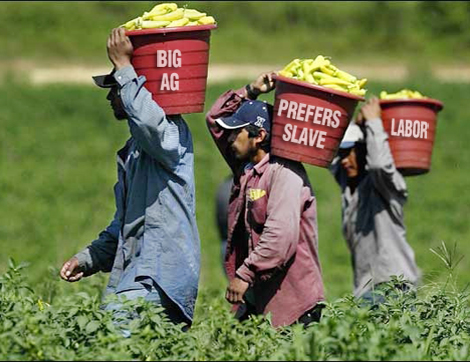
• Tough laws drive away thousands of illegals, but legal aliens, Americans fill void
By Keith Johnson
Thousands of illegal aliens have fled the southeastern United States thanks to strict migrant labor laws being enforced in Georgia, Alabama and South Carolina. This has come as bad news to the multibillion-dollar agriculture industry, which has long relied upon these undocumented workers to provide a hard day’s work in exchange for a slave’s wage.


In an attempt to dissuade other states from following suit, Big Ag has embarked upon a ruthless media campaign, insisting that the recently enacted legislation has crippled the growth of the fruit and vegetable industry and left farmers with no qualified pickers to harvest their crops.
“These businesses make claims that they have produce rotting on the vines, but there’s very little evidence of it,” said Jon Feere, a legal policy analyst with the Center for Immigration Studies, who recently spoke with AFP. “If there’s produce to be pulled, they’re going to find a way to do it. That means paying a better wage that attracts a legal workforce. In many of these states, unemployment is at an all-time high. So to suggest there are no willing workers is just silly.”


Contrary to an oft-recited cliché, said Feere: “There is no job that Americans can’t do. What these businesses are really saying is that they can’t find willing workers to pull produce at the wages they’re willing to offer.”
Feere goes on to say that even if farms did have trouble finding workers, other options are still available. “Most industries can be mechanized so that fewer humans are needed for harvesting,” he said. “However, there are some upfront costs to mechanization, and businesses have been unwilling to invest in the needed technology because they assume there will be a continuous supply of cheap, exploitable labor.”
Concerns that a higher wage will drive up food prices are unfounded. According to Feere: “We’ve learned that the average labor cost for a piece of produce is somewhere around three cents to a dollar. These businesses could actually double the wages they were offering and you really wouldn’t see more than a few pennies tacked on.”
This reporter also spoke with D.A. King, president and founder of the Georgia-based Dustin Inman Society. King has been deeply involved in the creation of Georgia’s illegal immigration legislation since 2004. He tells AFP that farmers have long had the option of legally hiring foreign nationals through the H-2A guest worker program.
However, according to King: “The agriculture industry, which collects taxpayer benefits in the form of subsidies, is now howling that it’s too expensive to obey the law. Here in the state of Georgia, during last year’s legislative process, the Ag lobbyist came to committee in a very arrogant manner and told everybody that the H-2A program is ‘like a Cadillac, and not everybody can afford it.’”
King goes on to say that part of the Ag lobby’s agenda is to put these illegal laborers on a path to citizenship. “But if you legalize the laborer who is working in a 110° onion field in south Georgia, those people are going to go to work in an air-conditioned Walmart, thereby still leaving a big hole,” said King. “The farmers are still going to have to either raise the wages or continue to hire the next wave of illegal[s].”
——
Keith Johnson is an independent journalist and the editor of “Revolt of the Plebs,” an alternative news website. Keith is also a licensed private detective.

